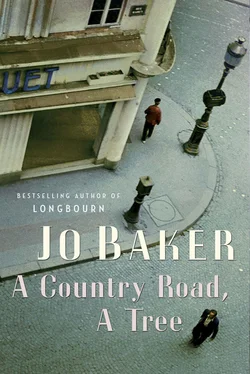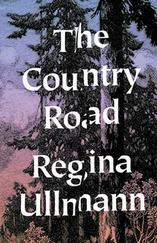“Problem?” she asks.
“No,” he says. “It’s fine.”
And so, definitively, he prints his name on the page and signs, committing himself to a sum that he really can’t afford.
“Monsieur and Madame Joyce are staying here, I believe?” he asks, and clears his throat.
“There is a gentleman and lady of that name, yes.”
He thanks the receptionist, and hates him. He takes the key and turns to lift Suzanne’s backpack, brushing off her protests, which are hardly meant. There are too many stairs; they just keep on going up and up until they reach a narrow landing, a corridor and a small dark door, where the number matches the number on their key. Inside, he drops their bags and the two of them fall on to the bed. It sinks beneath them, springs creaking. They lie there, parallel, feet trailing to the floor.
“Are you hungry?” she asks, a little later.
“I am, yes.”
“I’ll get those biscuits,” she says. But she doesn’t move. After a while, he sits up, strips the laces from his boots and toes them off, wincing. Then he unties her shoes for her too, and eases them from her feet and rolls down her stockings for her. Her toes are patched with red, her ankles swollen.
“Put your feet up,” he says.
She heaves herself round with a grunt and falls back on the pillow. He winces his way around the bed and lies down properly beside her. The shutters are closed. His eyelids are heavy. He thinks, I will just rest my eyes for a moment, but the next moment it is tomorrow.
—
He is returning from the bank. Where they will not cash a cheque — not his cheque anyway, not on an Irish bank. The hotel won’t take them either. He doesn’t know what he’s going to tell Suzanne. On a whim he ducks into a boulangerie and buys brioche, the smell making his stomach clench tight like a clam. This is money that should be used to pay for the room, but he doesn’t have enough to pay for the room and so it hardly seems to matter if he dispenses what little he has in dribs and drabs. Food. Shelter. Money. Shelter. Food. Money. It is all so simple and yet so unresolvable, and he is frowning over it, as though there were some obvious solution that he had missed, when his gaze snags on a dark figure across the street. He pushes his specs up, peers, and his face softens. There he is. The man himself. The crowds part around his strangeness as he fumbles along with his stick and glasses, oblivious and uncanny and sharp as you like.
He lopes across the avenue to him, up on to the far pavement, addresses him in English. “Mr. Joyce, sir.” He reaches out a hand, stops short of touching the sleeve. “Good morning to you.”
The head goes up, searching. The eyes are concealed by his dark glasses. He tilts his head.
“My word,” Joyce says. “Is it yourself?”
He says, “It seems so.”
“Ha! At last, thanks be to God, somebody to talk to.”
“Have you had any news, sir, from Paris?”
“No, no. Not a word. No one tells me anything.”
Joyce gropes forward with his stick; he turns his head to catch what he can in what’s left of his sight.
“Is that a dog?”—and an old hand fumbles into a pocket.
It’s a fluffy, perky little thing going by on a lead, tail up, arsehole on show, totally oblivious to the pair of them.
“Yes.”
Joyce has brought out a handful of stones, is picking through them with dry fingertips. “Where is it?”
“Gone,” he says, perturbed.
The old hand closes, slides back into the pocket. “Filthy creatures. They have no souls, you know.”
“Is that so?”
“They run loose all over the village. That place where we were staying. Saint Machin Truc. They bark at me.”
“Do they?”
He watches Joyce quite openly, knowing that he is not himself observed. It has been, what, six months since he saw him last? But it looks as though as many years have passed for the older man. Shem has stepped over a threshold, is suddenly old. He is crumpled-looking, his hair slick with pomade, but the white now shines through. His skin is slumped; he looks as though he’s wearing a mask of himself, of his own skin. The rings roll loose around his fingers.
“How are you, though?” he asks.
A shake of the head, a sigh, and then there falls a cascade of words. “I don’t know what we are coming to, I really don’t. All the books I want are still at the apartment in Paris, and I can’t get hold of anything I want down here. People say that they’ll send me books, but no one ever really sends me books, or not the right ones. Madame Jolas is pestering us to come back to the village, where we are safe, but you know what country life is. Anything is preferable to that, there’s no one to talk to, and the flat’s so small you couldn’t kill a cat in it—” A pause, a moment. “Vichy is a hole, but it is not as deep a hole as Saint-Gérand-le-Puy. I’m very glad, you know, that you have come. You will be an asset.”
To be noticed like this has its brief effect; it makes him more real, it makes him mean something. But the talk goes on and on as Joyce continues with his litany of complaint, and it need not really be him at all that hears it: the lack of notice of his Wake, the pointlessness of this war, the failure of others to see what is really necessary and important, Nora’s impatience, Lucia’s distractedness, Giorgio’s absences — the Lord knows what he is up to. Family concerns, family, family, family.
He nods. Of course. Family is what matters most at times like these.
But family is his mother sitting alone in the house by the harbour, watching the sea wind tear across the water and the cemetery and her husband’s grave. Family is Frank squinting out across the golf course, or hunched over his desk, doing capable things with account books and a slide rule. Is Mollie and Sheila, the tousled girls; is dispersed through Ireland, Wales and England and the Lord knows where. And he can’t go back to that, to family, because there is nowhere to go.
“Did you ever drive that ambulance?” Joyce asks.
“We were somewhat overtaken by events.”
At the hotel, they part with a handshake and a promise to meet later; they will go out for a drink.
And then, the thin old mouth parting on false teeth: “It’ll be just like old times, eh?”
He leaves Joyce waiting for Nora in the lobby and climbs the heavy stairs. Joyce exerts such a deliberate gravity; he draws one in, he buffers one away. One’s kept in orbit, circling.
—
He is woken by a rapping on the door. Suzanne sits up. Her face is lined by the pillow. He stumbles off the bed. In the doorway there’s a red-faced boy in livery, confusing just by being there, and then by being apologetic and in too much of a hurry to make sense.
“What? Sorry? Say that again.”
The boy redelivers his lines. He’s an unconvincing actor, distracted by what’s going on offstage. This is only one of many times today that he will have to blunder through this speech.
“What?” Suzanne says, shaking her head to clear it. “What is he saying?”
“The manager apologizes, we understand that this must be very inconvenient, but we are unable to continue to provide accommodation for you here.”
“What?”
“You must vacate the hotel in the morning.”
“But we’ve only just arrived.”
The boy looks off down the corridor. “It can’t be helped. It’s out of our hands. Government orders.”
“I don’t understand.”
“Paris has fallen,” the boy says, a little too loudly and quickly. Then he pauses, straightens his shoulders, clears his throat. “Paris has fallen, and so the government is to move here. They are to take over the hotel. All the hotels.” Though the boy holds himself straight, his young eyes are brimming.
Читать дальше










